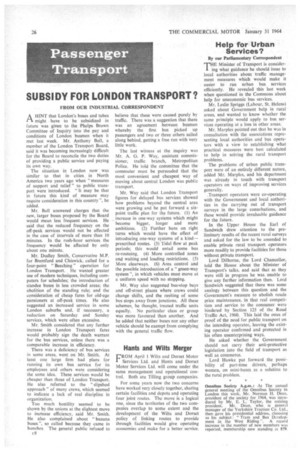Help for Urban Services?
Page 28

If you've noticed an error in this article please click here to report it so we can fix it.
By our Parliamentary Correspondent
THE Minister of Transport is consider" ing what guidance he should issue to local authorities about traffic management measures which would make it easier to run urban bus services efficiently. He revealed this last week when questioned in the Commons about help for uneconomic bus services. Mr. Leslie Spriggs (Labour, St. Helens) asked about Government help in rural areas, and wanted to know whether the same principle would apply to bus services operating at a loss in other areas. Mr. Marples pointed out that he was in consultation with the associations representing local authorities and bus operators with a view to establishing what practical measures were best calculated to help in solving the rural transport problems. The problems of urban public transport were of an entirely different nature, added Mr. Marples, and his department was already in touch with transport operators on ways of improving services generally. .Transport operators were co-operating with the Government and local authorities in the carrying out of transport surveys in the large conurbations, and these would provide invaluable guidance for the future.
In the Upper House the Earl of Sandwich drew attention to the preliminary results of the recent rural surveys and asked for the law to be amended to enable private rural transport operators more readily to provide facilities for those without private transport.
Lord Dilhorne, the Lord Chancellor, told the House about the Minister of Transport's talks, and said that as they were still in progress he was unable to give any further information then. Lord Sandwich suggested that there was some analogy between this question and the Government's measure to abolish resale price maintenance, in that real competition and service to the consumer were hindered by Section 125 of the Road Traffic Act, 1960. This laid the onus of proof of the need for public transport on the intending operator, leaving the existing operator confirmed and protected in his often unenterprising ways. He asked whether the Government should not carry their anti-protective legislation into the field of transport as well as commerce. Lord Hawke put forward the possibility of part-time drivers, perhaps women, on mini-buses as a solution to the rural problem.




















































































































